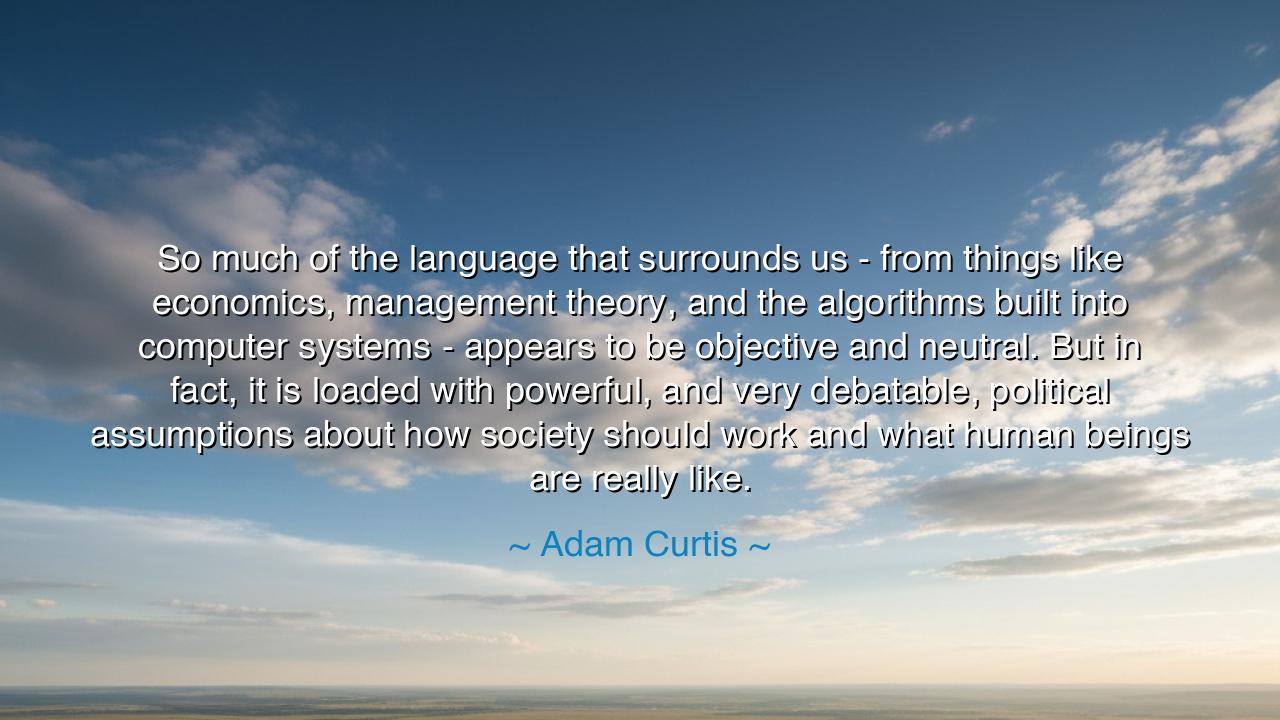
So much of the language that surrounds us - from things like
So much of the language that surrounds us - from things like economics, management theory, and the algorithms built into computer systems - appears to be objective and neutral. But in fact, it is loaded with powerful, and very debatable, political assumptions about how society should work and what human beings are really like.






Hear the unsettling yet luminous words of Adam Curtis, the chronicler of hidden powers: “So much of the language that surrounds us—from things like economics, management theory, and the algorithms built into computer systems—appears to be objective and neutral. But in fact, it is loaded with powerful, and very debatable, political assumptions about how society should work and what human beings are really like.” This is not the murmur of a cynic, but the cry of one who has peered beneath the polished surface of modern life. He warns us that the world we live in is draped in the disguise of neutrality, yet beneath the mask lies ideology, interest, and manipulation. What we are told is objective often hides the hand of power.
The origin of this thought lies in Curtis’s work as a filmmaker and essayist, dissecting the myths and structures of the modern age. He observed that the languages of economics, management, and technology cloak themselves in the authority of science and logic, promising truth that is beyond debate. Yet, he shows, these systems are not mirrors of reality but instruments that reflect the desires of those who built them. The algorithms that dictate our choices, the theories that shape our labor, the models that predict our futures—these are not neutral forces. They are laden with assumptions about competition, obedience, control, and even about the nature of the human soul.
The ancients, too, warned us of the power of hidden language. Recall the Sophists of Athens, who dressed their arguments in the appearance of reason but twisted words to serve private ends. Socrates confronted them, teaching that truth must be sought, not merely spoken. Curtis’s warning is born of the same spirit: that the greatest danger is not the obvious tyrant, but the ideology that pretends to be neutral, while silently shaping how we see ourselves and others.
History bears witness as well. In the early 20th century, the language of eugenics was cloaked in the authority of science, presented as objective truth about biology and society. It claimed neutrality, yet it carried devastating political assumptions: that some lives were worth more than others, that society should be engineered to fit a narrow vision of perfection. Millions suffered because people mistook this language for fact rather than ideology. Just so, Curtis warns us of today’s hidden languages, where numbers and codes dictate human worth without admitting the assumptions they rest upon.
The meaning of Curtis’s words is thus both revelatory and urgent: we must never take for granted the language that claims to be objective and neutral. For in reality, these languages are tools, built by people with visions, biases, and interests. To ignore this is to surrender our freedom, to allow unseen powers to decide who we are and what kind of society we shall inhabit. But to question, to challenge, to unmask the hidden assumptions, is to reclaim our place as authors of our own destiny.
What lesson, then, shall we take? That we must become vigilant readers of the world. Do not be lulled by numbers, by charts, by the calm voice of authority. Ask always: whose vision is this? Whose interests are served? What kind of human being is imagined here? For in asking such questions, we pierce the veil of neutrality and reveal the struggle beneath. And once revealed, the assumptions can be debated, reshaped, or rejected, so that society may reflect not only the will of the powerful but the dignity of all.
Therefore, children of the future, engrave this wisdom upon your hearts: no language is neutral, no system without vision, no algorithm without bias. Do not bow before the false gods of objectivity, but examine them, test them, and, if need be, break them. Build new languages that honor justice, that reflect compassion, that embrace the complexity of human beings rather than reduce them to numbers. For in doing so, you will ensure that society is not built upon hidden chains, but upon truth and freedom that endure through the ages.






AAdministratorAdministrator
Welcome, honored guests. Please leave a comment, we will respond soon